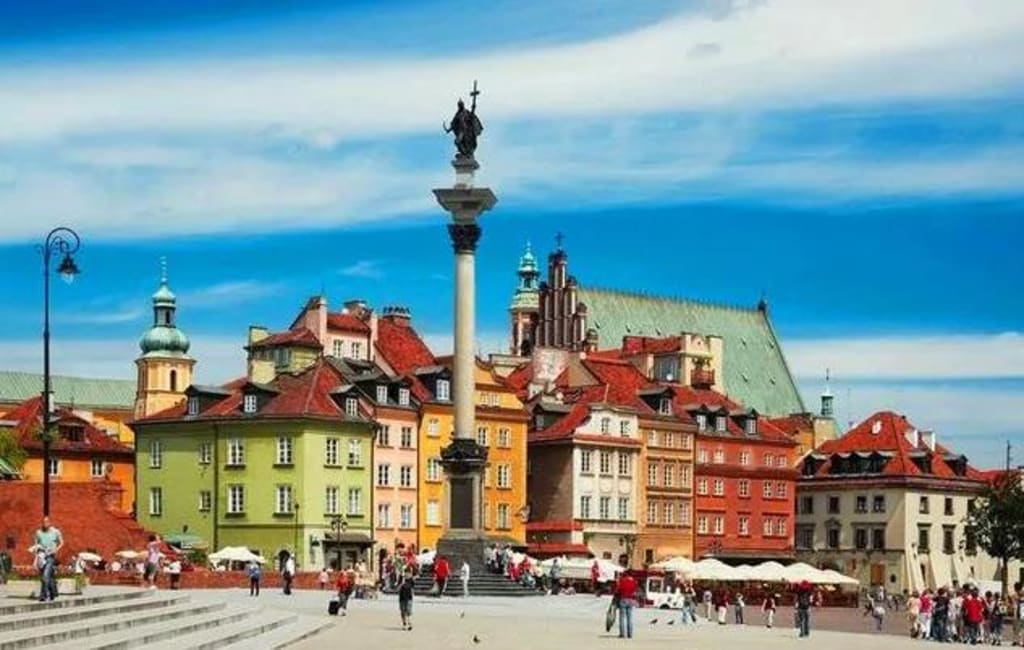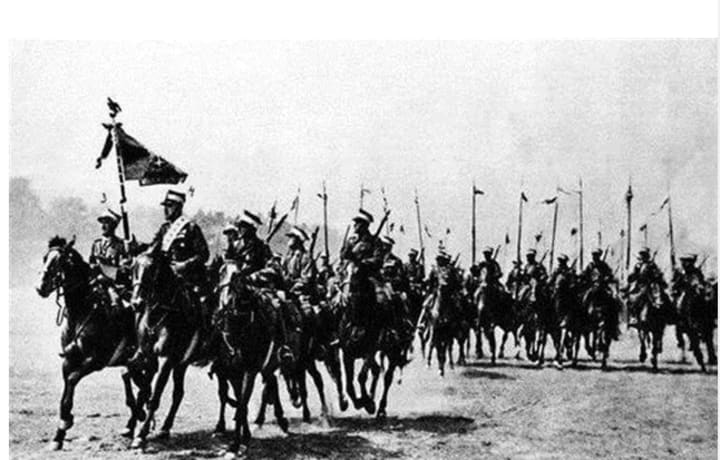
"He who always asks for directions does not get lost." This is a famous Polish proverb, which speaks of Poland's strong nationalist sentiment and its difficult modern history of climbing up the parasitic ladder.
Since the 18th century, Poland has fallen three times and been reborn three times. In the modern history of Europe and even the world, Poland's history of national death and restoration makes it a sad country, a country that has been asking for a way out. And when you look at the political stance and strategic choices behind Poland's history, you have to lament that it should be so.
Caught between the European powers, Poland was in an uncertain position, divided three times by Tsarist Russia, Austria and Prussia, with a long history of puppet state in its short modern history, and to this day, Poland is still a puppet of the United States. A history buff once jokingly said, "Poland is the European version of Korea, and Korea is the East Asian version of Poland."
Although one of the two countries is sandwiched on the European continent and the other is far away in a corner of East Asia, their geography, culture, population, customs, and so on are very different, but the two countries fervent nationalism and unscrupulous ambition are the same.
If we have to find a spiritual difference, it is probably that although Korea is under the control of the United States, it still puts its national interests first and is not willing to be completely manipulated by the U.S. Unlike Poland, which is a country that is happy to follow the wolves.
Of course, all this does not change the past and present of this European version of Korea, whose heart is higher than the sky and whose life is thinner than paper.
"Three deaths and three restorations" - the heart is higher than the sky, but the life is thinner than paper
In 1795, Tsarist Russia, Austria, and Prussia signed the agreement on the third partition of Poland, and thus the territory of Poland was completely divided up.
Poland and Tsarist Russia go back to Poland's heyday, when Poland never gave up on its neighboring Tsarist Russia since the 16th century, when it captured its capital, Moscow, and interfered in the internal affairs of Tsarist Russia, "helping" to install two tsars in Russia.
The three deaths of Poland in the history of Poland have deep roots in Tsarist Russia, and the international comparison of the history of China and Japan to the Polish-Russian feud is an insult to both China and Japan, especially China, which has never initiated a war of aggression and expansion in its modern history, while the Polish-Russian conflict is a historical feud and a conflict of interests.
The fall of Poland in its history

The first choice was the conversion of all citizens to Christianity by Meszko I to escape the offensive of Otto I. This was the beginning of Poland's habitual dependence on the powerful.
The choice of Meszko I was a realistic one, and although it was weak for a generation of archdukes, the conversion to Christianity objectively contributed to the economic and cultural development of Poland, laying the foundation for its next growth and prosperity.
But in a country, as geopolitically charged as Poland, the sudden conversion to Christianity stood out in several regions where Orthodoxy was prevalent, such as Belarus and Ukraine
Meško I
In 1569, the Grand Duchy of Lithuania and the Kingdom of Poland merged, and Belarus and Ukraine were incorporated into Poland. The complex ethnic composition of the country and the numerous religious disputes led to a deepening conflict between the East and West Slavic peoples.
In 1815, when Napoleon was defeated, the Duchy of Warsaw was divided between Prussia and Austria and restored Poland was once again short-lived.
If a country cannot be truly independent, it cannot even stand on its feet, so how can it talk about prosperity? The root cause of Poland's problems was its long-standing aristocratic democracy, in which the monarch was elected by the nobles and was accountable to them.
However, if a country's aristocracy is too powerful, there will always be uprisings and confrontations, so why did Poland maintain this "harmonious" political system until the end of the country? The first reason was the large population base of the nobility, which accounted for almost 20% of the Polish population.
Secondly, the mass base of people who responded to the reform was weak, and it was difficult to realize the prerequisites for reform; furthermore, the small peasant economy dominated the Polish economy for a long time, and the commercial economy with reform and opening up as the core was sluggish. The inability to reform and the selfishness and greed of the aristocracy led to a long period of looseness and anarchy in Poland.
The Polish aristocracy held absolute power over the state
In 1939, Germany blitzed Poland, and the Soviet Union took advantage of the situation, thus Poland was once again left with no country. Poland's sadness almost spilled off the screen, and it gave the world a profound lesson: being dependent on a powerful country is never a long-term solution for a weak country.
Bullying Soviet Russia, betraying the Anglo-French alliance, Poland currying favor with Nazi Germany, and supporting the Japanese bombing of Nanking when people all over the world were united against the fascist forces ......
At this moment, Poland's random political strategy revealed the kernel of its stupidity, and Germany's blitz on Poland was the biggest mockery of this country's tendency to follow its interests, as well as a wake-up call to the countries and forces in the world that are trying to attach themselves to hegemony and all those who are against humanity.
Germany blitzes Poland
"The meaning of a firm strategic choice
There was no more damning news about Poland in '19 and '20 than the frenzy with which the Polish people and government welcomed a permanent U.S. military presence in Poland. While most of our friends who see U.S. troops as jackals and tigers may not understand, Poland is sincere.
Poland and Russia are neighbors, but the fear of the Soviet Union has been deeply rooted in Poland since the 1940s when Poland became a satellite of the Soviet Union.
Poland's fear of Soviet Russia has been deeply rooted in its heart
In the years after World War II, many Third World countries began to explore their paths, such as China, but Poland missed the boat and was so firmly trapped by the Soviet Stalinist model that it is now willing to take shelter under the United States.
Poland's decision to temporarily save itself from the Russian threat is a practical one, but it does not change Poland's position as the front line of confrontation between the two camps, which is determined by Poland's geographical location and its wavering strategic choices.
On September 12, 1989, Poland's political system was shaken when Solidarity came to power and Poland embarked on a long road back to Europe.
"Joining NATO and the EU" was the priority, and in July 1997, the NATO Madrid Summit adopted the Madrid Declaration on Euro-Atlantic Security and Cooperation, inviting Poland to join NATO.
Poland joined NATO
Such a path is different from both the British policy of "continental parity" and the American policy of "isolationism", and is not comparable to China's independent and peaceful development path.
Poland's special and tragic geographical position makes it difficult for it to expand its armaments and strengthen its comprehensive national power, so its relationship with NATO is a perverse and asymmetrical one, in which a nominally independent country is more dependent on a military bloc than on a state.
And then on Poland's relationship with Russia, full reconciliation? Not unless Poland comes out with a blooming Madonna who still has to exude the glory of Athena. Poland's early policy toward Russia after the Cold War was to "suppress Russia" and "alienate Russia", which still depends on the disparity between its strength and that of Russia.
The normalization of relations between the two countries is still the expectation of Russian and Polish scholars and people, and the Polish historical community has a clear understanding that "it is only a matter of time before Russia rises again, and Poland should urge the normalization of relations between the two countries as soon as possible."
About the Creator
Lu Na Ba
Have you ever thought that even the most eternal love will fade away?






Comments
There are no comments for this story
Be the first to respond and start the conversation.